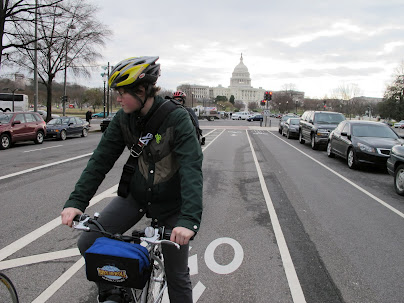This week, the House and Senate are expected to name the people they’ll send to conference to come up with a new transportation bill. The Senate will be bringing its bipartisan bill; the House is bringing a bunch of poison pills. The president says he will veto anything with a Keystone pipeline approval in it, giving both sides the chance to say they’re putting Keystone before a massive infrastructure/jobs bill.

There are also amendments to deregulate coal ash and protect the Harbor Maintenance Trust Fund from poaching to fund surface transportation. Probably the amendment that has reform-minded folks most riled up (aside from the Keystone provision) is the one to tack on H.R. 7’s “streamlining” provisions, which nine environmental groups have said “would eviscerate our nation’s bedrock environmental laws [NEPA] and stifle public participation in the environmental review process.” All Democratic amendments -- and one Republican amendment to “devolve transportation authority back to the states” – were rejected.
Notably, no one even proposed language to strip out Transportation Enhancements or the Congestion Mitigation and Air Quality Improvement Program (CMAQ). TE, especially, with its “set-aside” funding for things like bike/ped safety, has been the target of a special brand of Republican loathing. The Senate bill makes changes to the programs that bike/ped advocates have fought hard against, but it doesn’t just eliminate TE, as H.R. 7 would have.
Senate conferees will try to strike down these amendments and force passage of S. 1813 without these add-ons. But the House has had its opportunity to pass the Senate bill without amendments and rejected it. So, the stage is set for more of the bitter gridlock we’ve come to expect. A recent (non-scientific) poll by our friends at Politico’s Morning Transportation found 46 percent believing that Congress will approve a transportation bill before the current extension expires June 30, with almost the same number – 42 percent – believing it’ll be nothing but extensions till 2013.
And remember, even if they do manage to pass a bill by June 30, it’ll only be a 15-month bill. We will have had 33 months of extensions by then.
In related news: the Senate Transportation and HUD Appropriations Committee passed a 2013 budget last week [PDF], allocating $53.4 billion, down from $57.3 billion this year. Don’t be alarmed, though: as David Burwell at the Carnegie Endowment points out, it “includes a $5.4 billion increase over 2012 in unscored, offsetting receipts from HUD housing programs which, when added to the $53.4 billion comes to $58.8 billion.” The Senate budget includes $50 million to the Partnership for Sustainable Communities Regional Planning and Challenge Grant programs, which many fear the Republicans want to dismantle altogether, and $100 million for non-high-speed inter-city rail improvements, mostly for track upgrading. The rail appropriation is still a pittance compared to the Obama administration’s big dreams of bringing high-speed rail to 80 percent of the country, but it’s better than the big fat zero being proposed by the House.
The Senate also continues the TIGER grant program at half a billion dollars – same as 2012. Highway and transit get the same dose they did this year too.
The budget goes to the full Appropriations Committee next, but a vote doesn’t seem to be scheduled yet. Just as well – Majority Leader Harry Reid has made it clear that he doesn’t plan to pass a 2013 budget before the election.





